Business Of PHC, Part 2: Elements of a Plant- Health-Care Business Plan
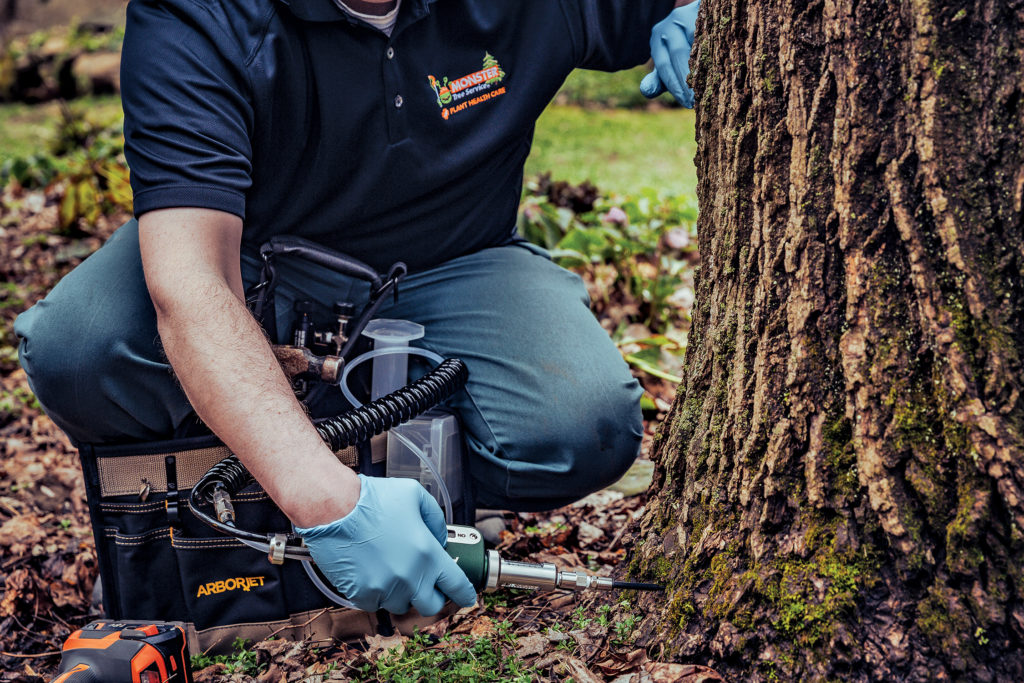
“How do you start a plant-health-care program? If you buy a spray rig and put it into your pickup, you aren’t exactly a plant-health-care professional,” says Chris Kemp, plant-health-care manager with Piscataqua Landscaping & Tree Service, an 11-year TCIA member company based in Eliot, Maine. “The blanket or cover sprays of the 1980s are a practice of the past. So what makes a successful PHC program? What does your business plan look like?”
Those two questions are basically what we asked several of those who have built PHC programs, in essence, “What are the key elements of a business plan for a small tree care business that is looking to get into PHC?”
“There are many parts to your business plan, but two critical components are your target clients and your knowledge of trees, that is, your understanding of tree biology and the pests that can attack them. PHC is not a tangible service; it is not like tree work, where there is a clear before-and-after effect. Your clients have to understand what you are doing, why you are doing it and what to expect. Client communication is key!” says Kemp.
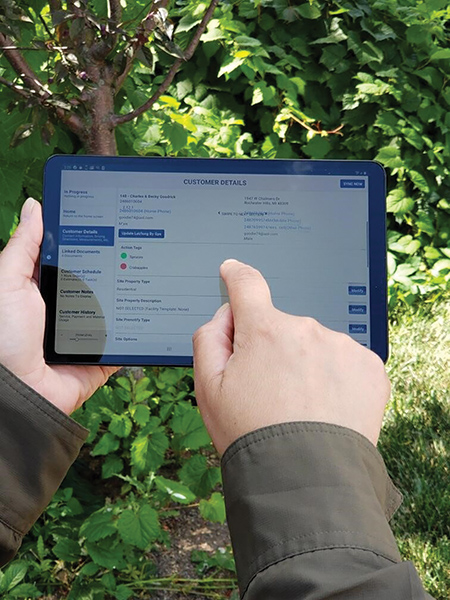
“Once your clients are on board, you need to define what exactly your PHC program is. What does it do? Is it only pest control? Is it ‘fertilization?’ Is it both? What kind of spray rig will you use? Many companies prefer spray units that can be removed so the truck can be used year-round for things such as plowing and salting.
“I said ‘fertilization’ in quotes above because some fertilization programs only use a standard N-P-K fertilizer, while many companies use more costly materials such as soil amendments (beneficial bacteria, beneficial fungi, humates, etc.) but still refer to this as fertilization. It is critical to clearly define your programs,” says Kemp.
“Knowing your material cost is critical to establishing your rate. What you charge clients depends on all your costs involved, including your knowledge – don’t underestimate what your tree knowledge costs!
“Your business plan needs to be your blueprint or manual for how your program operates – costs and revenues,” says Kemp. “The expenses include details such as the cost of your spray unit and the cost of a pesticide-storage unit that meets state and local requirements, costs of fertilizers and pesticides, state reporting requirements and state licensing, additional insurances, personal protective equipment (PPE) and, very important, the expense of continuing educational units (CEUs). The education related to CEUs keeps us informed on everything affecting our industry, from new pests and pesticides to broader issues, such as how climate change is affecting what we do. My business plan gets tweaked regularly – new pesticides are always being added, more efficient equipment is being purchased and new staff are being trained and joining the team.
“Relationship building is also a key component for any successful business, and tree care operations are no exception,” notes Kemp. “I am always speaking with others in our industry, asking questions. Key people I would speak with are my insurance agent (how new equipment affects my premium), my banker (Is it time to refinance?), the director of the State Pesticide Control Division (What licenses do I need for an added PHC service?) and pesticide dealers (What’s new and improved, and are there discounts for buying in bulk?).”
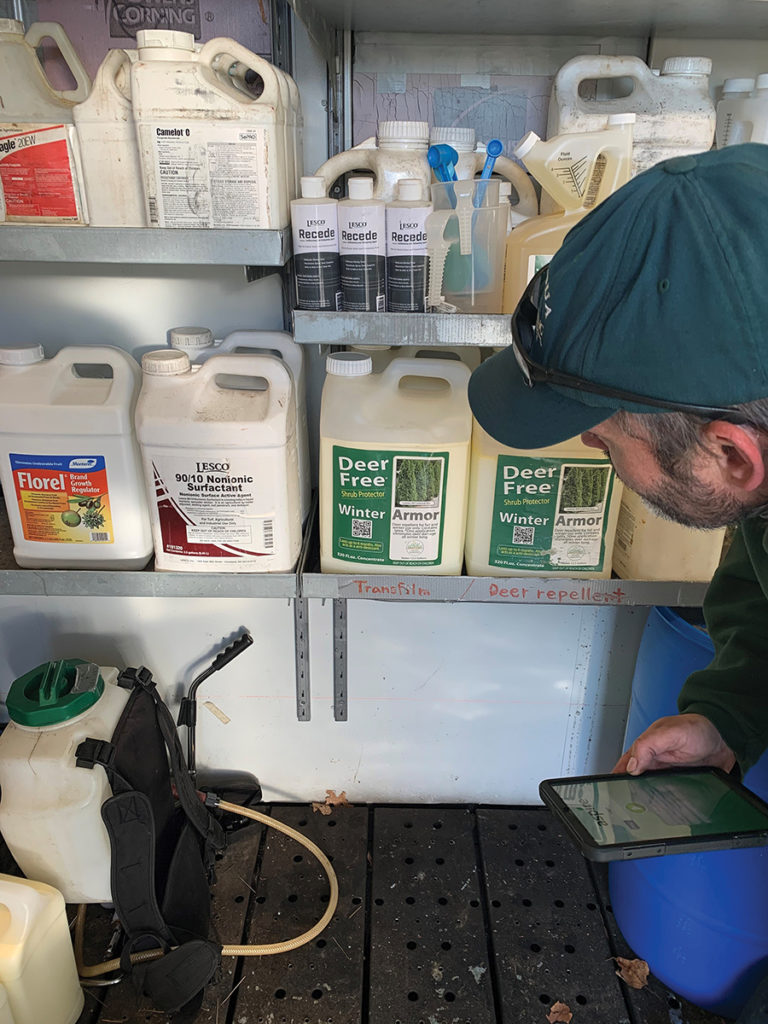
“When I started my business more than a decade ago, my equipment consisted of a truck, a few buckets, a two-gallon sprayer, a backpack sprayer and basic PPE,” says Mark Spitulski, owner of MKS Arborist Services in Erie, Pennsylvania. “I sold pruning, planting and treatment jobs that I could schedule around my day job and invested the profits I made back into my business.
“After a few years, I was able to upgrade my equipment to include tree- and soil-injection systems and a custom-built 150-gallon sprayer. Eventually, I left my day job to focus on my plant-health-care business full time,” says Spitulski.
Now, in addition to its own PHC work, MKS does all the PHC work for Jacob Thomas, CTSP, owner of J. Thomas Tree Service, Inc., an accredited, 15-year TCIA member company based in Fairview, Pa.
“The most important investment when entering the plant-health-care field is not money. It is far more important to invest the time to become knowledgeable about plant identification, common problems and reliable treatments, and to put the effort into building a positive reputation in your market area,” says Spitulski.
Learn everything you can about the plant-health-care field, Spitulski says:
“Research the insects and diseases that affect plants in your region and familiarize yourself with the resources available to help you prevent, diagnose and treat the most common plant-health-care issues in your area. In Pennsylvania, Penn State University has a disease and insect lab where I can send samples for identification and resources to build knowledge about both common and emerging plant-health-related issues. Learn the basic life cycles of common pests in your area so you know when to scout for infestations, and familiarize yourself with the causes and symptoms of plant diseases.
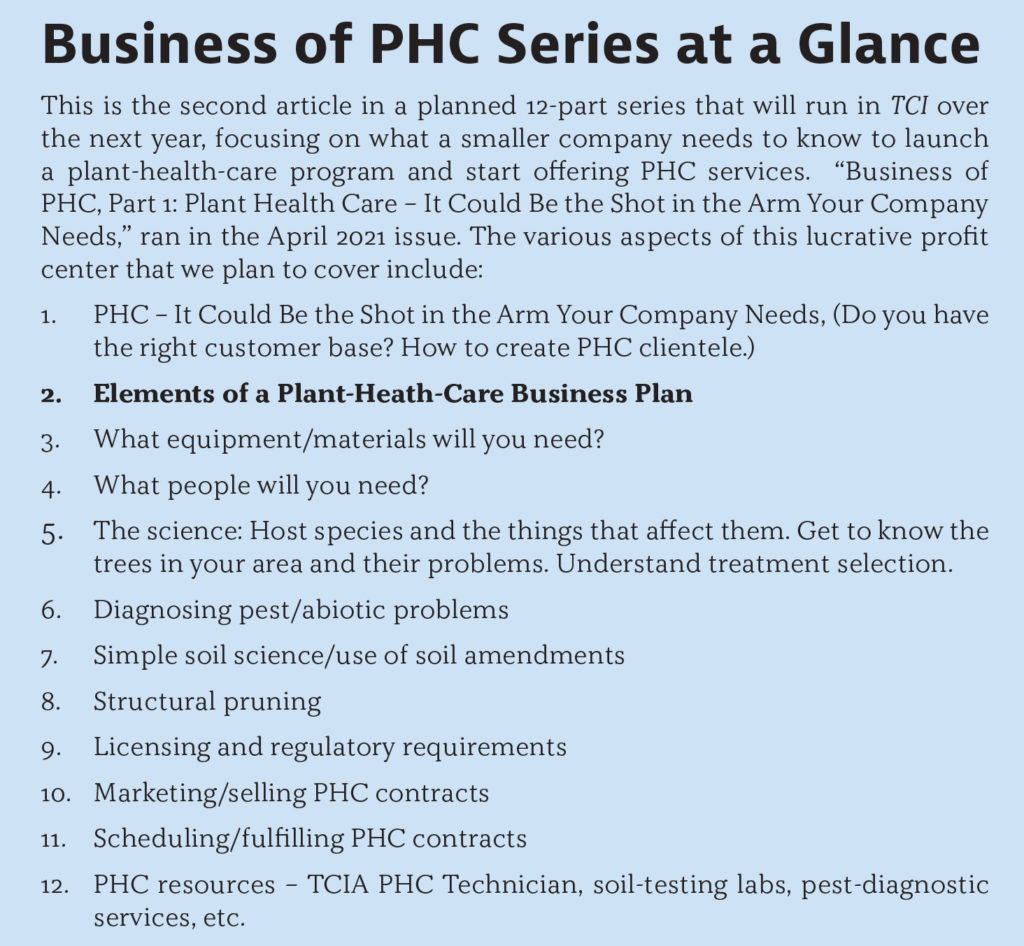
“Learn about the ideal growing conditions for the most common plants in your region. A plant growing in poor soil will often exhibit issues that are easily corrected by performing a soil test and having the knowledge to correct any issues. Soil testing and correction is a service that can be done relatively easily without expensive equipment.
“Having a solid knowledge of chemicals, proper handling practices and PPE is a must. Chemical products and application methods are always evolving, so it is important to take advantage of resources like webinars and classes to stay on top of the most current research. Make sure to investigate any requirements your state has that apply to chemicals and their application, and obtain the appropriate licenses and certifications.”
Spitulski goes on to say, “Knowledge and experience help you get started in plant health care, but your reputation as a service provider is what allows you to make plant health care a career. Focusing on good, honest customer service is important for any business, but especially a business like plant health care, which is built on recurring service and repeat business. This includes attention to detail and organization of customer information so you can maximize the potential of every job.
“It also includes good communication skills, an understanding of the basic needs of the customer and, sometimes, a willingness to admit you do not have an immediate answer but are ready to do the necessary research to find one. A well-researched answer delivered in a timely manner will always be better than a guess in the moment.
“Once you have demonstrated knowledge, integrity and a willingness to go the extra mile, your customers will begin to trust your judgement with regard to fertilization schedules, treatment plans and other recommended services. Networking with others in plant-related fields, such as landscaping and tree service, is essential in building good professional relationships you can count on for help and mutually beneficial referrals,” adds Spitulski.
“As one of the most important parts of the business plan for PHC, it is crucial for me to address waste of technical product, irresponsible applications and treatments using broad-spectrum, inexpensive products,” says Kathy Glassey, director of renewable resources for Monster Tree Service, an 11-year TCIA member company based in Fort Washington, Pa. Monster has 87 franchise operators covering 200 regions around the country, and is currently rolling out a PHC initiative for its network.
“While broad-spectrum products certainly have a place in our industry, they should never be the first or only option,” says Glassey. “In my tenure in the green industry, the biggest lesson I have learned is how much more productive and profitable a company can be when care and focus are on proper planning.
“Monster has created efficiencies in our software and our approach that encourage our (franchise) owners to eliminate unnecessary waste of products and labor,” says Glassey. “They do this by integrating efficient routing and planning of our treatments, which allows for predicting inventory needs, effective record keeping and remaining compliant with all regulatory components in our owners’ respective states.
“The second area is customer service,” notes Glassey. “Customer service has become a difficult process for many of us in many areas. How many times have you called a company and had to have the same conversation multiple times, because someone on the other end either couldn’t or wouldn’t help to resolve your concern? A service business should always put customer service high on the priority list, and for PHC this is crucial.
“Not all insects or diseases happen simultaneously, nor can we perfectly predict what could happen,” Glassey adds. “Very similar to us, trees can become stressed and ill. If they become dehydrated, they show signs. Paying attention to these clues is important to being successful and is the best service we can provide to our consumers. While we utilize growing-degree days and phenological indicators to help predict upcoming possible issues, there are many variables that can affect nature and our treatment suggestions.”
“There has never been a better time to consider starting a plant-health-care company or division,” says Steve Martinko, owner of Contender’s Tree & Lawn Specialists, a three-year TCIA member company based in Waterford, Michigan, and owner of Banner Sales and Consulting, Inc., a new TCIA corporate member company providing PHC products, based in Novi, Mich. “I can say this because sales will be easier during a time of rapid economic expansion coupled with many homeowners who are still working from home. In fact, I have personally helped establish six new tree companies to date, each with its own twist on the market its owners have chosen to serve.”
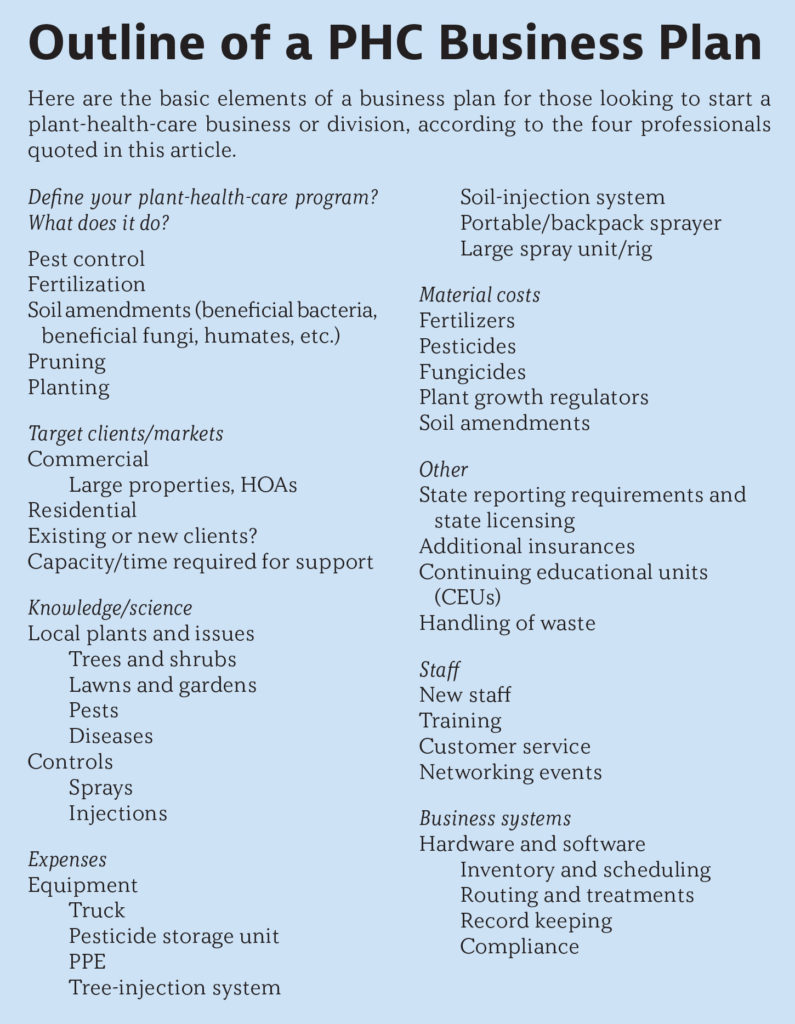
But despite it being a perfect time to expand, launching a PHC business can quickly consume ownership and management if not carefully orchestrated, warns Martinko.
“First and foremost, when building your business plan, appreciate the capacity required for supporting a PHC operation. The systems you create must be highly flexible and responsive if your goal is to maintain a recurring monthly relationship and be repeatable every year.
“Weather will drive chaos, so having the capacity to work in multiple areas with the least amount of drive time is crucial,” Martinko notes. “Successful PHC startups realize new clients can be needy at first until trust has been established, so having the least amount of drive time is a tremendous advantage.
“Not every startup has to have a state-of-the-art, $110,000 truck setup. Preparing a vehicle can be done with as little as $2,500,” he says. “Portable soil-injection units really make it easy for those who want to begin with simple root feedings and systemic-insecticide treatments. Tree-injection kits also make it possible for those who choose lower investment requirements over large trucks and tank spray systems.
“The key to solving equipment capacity is understanding the market you intend to serve,” says Martinko. “Will they pay more for injections over sprays? Do you plan on servicing large landscapes with hundreds of shrubs? Elaborate landscapes with large quantities of shrub material will require advancing your equipment capacity, but you can easily grow into this with a profitable plan.
“The old saying rings true, ‘What you don’t know you need to know can hold you back,’” says Martinko. “Just plan on focusing on the trees and shrubs you do know, as well as the insects and diseases you understand.
“Large company or small, it all comes down to rolling out a plan that focuses sales on your team’s strengths, so reputations are not adversely affected. No one says you must know everything.”
Echoing Mark Spitulski, Martinko closes with this tip. “Remember, when asked about something beyond your comfort zone, it’s best to collect a sample and let the client know you have some thoughts, but you will double check and get back to them. People appreciate an honest working relationship, and that is one of the best ways you can build trust.”
Conclusion
To paraphrase TCIA’s Business Management Guide, a business plan is a tool with three basic purposes: communication, management and planning. Despite the critical importance of a business plan, many entrepreneurs across all industries drag their feet when it comes to preparing a written document. But just as a builder won’t begin construction without a blueprint, eager business owners shouldn’t rush into new ventures, add new service lines or start new marketing campaigns without a business plan.


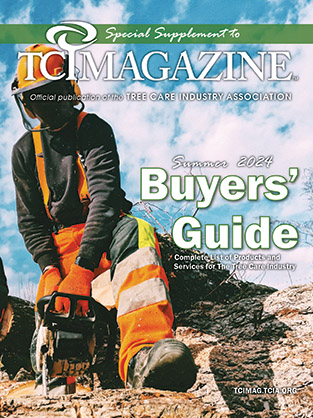


Excelente artículo.
Well if you are going with the business side of taking care of trees, you really have to research a lot and invest a lot of your time not just with money because if you don’t have enough knowledge your business will most likely to fail.
– Robert owner of south bend tree company
Agree. Money for investment could only get you somewhere. Like any businesses and interests, plant health-care is an activity that should also put time and effort personally other than resources. Research is continuous to get the very best of every plant health. -Mike from treeservicesnh.com